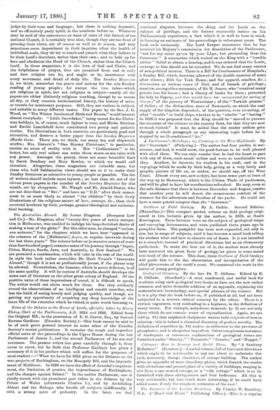Notes of the Debates in the House of Lords, officially
taken by Henry Elsing, Clerk of the Parliaments, A.D. 1624 and 1626. Edited from the Original MS., in the possession of E. G. Carew, Esq., by Samuel Rawson Gardiner. (Camden Society.)—This book cannot be said to be of such great general interest as some other of the Camden Society's recent publications. It contains the rough and imperfect official notes of the proceedings in the Upper House during the last Parliament of James I., and the second Parliament of his son and successor. The present writer has gone carefully through it from cover to cover, but he finds that Professor Gardiner has given a summary of it in his preface which will suffice for the purposes of most readers :—" What we have for 1624 gives us the Debates on the war projects of Buckingham, on the Monopoly Bill, and the impeach. ment of Middlesex. In 1626 we have the affair of Arundel's imprison. ment, the limitation of proxies, the impeachment of Buckingham, and the charges against Bristol." In the earlier Parliament, one is chiefly struck with the prominent part taken in the debates by the Prince of Wales (afterwards Charles I.), and by Archbishop Abbott and the Bishops, who handle all subjects indifferently, if
with a strong spice of pedantry. In the later, we find
continual disputes between the .King and the Lords on the subject of privilege, and the former repeatedly insists on his Parliamentary experience, a fact which it is well to bear in mind, in forming an estimate of his proceedings in subsequent years. The book ends ominously. The Lord Keeper announces that ho has received his Majesty's commission for dissolution of the Parliament, " not for any cause gyven by your LLps., but proceeding from the Commons." A committee which waited on the King with a "humble advice " failed to obtain a hearing, and it was ordered that the Lords, message to him should not be recorded. We do not find many entries of non-political interest. There is a Bill for Continuance of Hospitals ; a Sunday Bill, which, however, allowed of the double exercise of arms after dinner ; Bills for York House, and for apparel, coaches, &c.; discussions on various cases of libel, and of breach of privilege ; mention, among other recusants, of Sir H. James, who " reoeived many priests into his house ; had a library of books for them ; perverted his lady to Popery, and than would hare her reconverted for saying of charge ;" of the poverty of Westminster ; of the " Turkish pirates" of Sallee ; of the defenceless state of Newcastle, on which the coal supply of the kingdom depended ; of the question, over recurring, of what " moulds" to build ships, whether to be " nimble " or " lasting." In 1626 it was proposed that the King should be " moved to prevent the recourse of the citizens to the country fairs, for that they are now so much visited." It must be added that the reader seldom gets through a whole paragraph on any interesting topic before he is stopped by an ill-conditioned "&c."


































 Previous page
Previous page